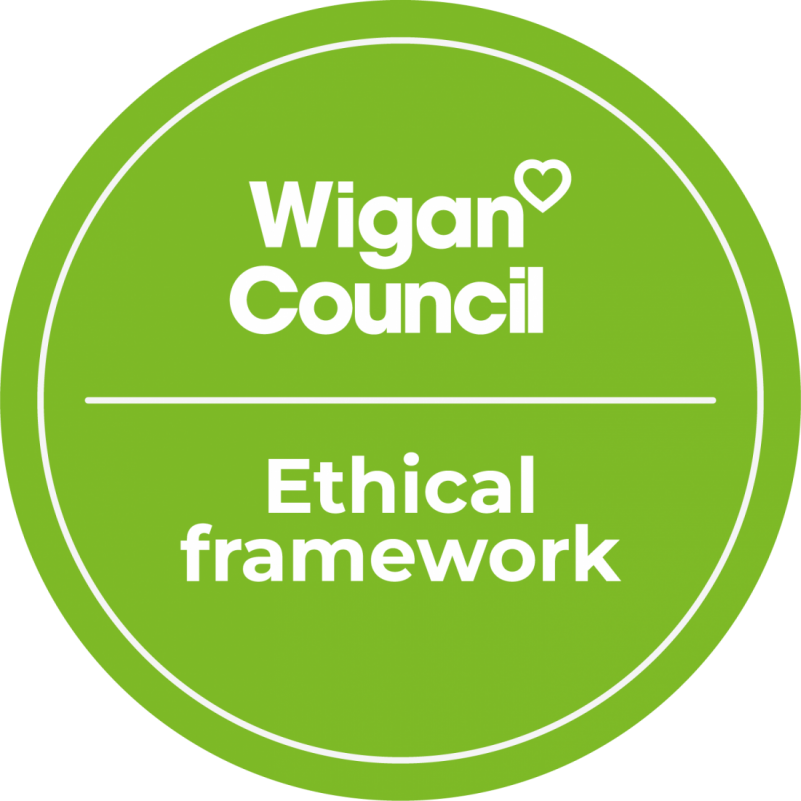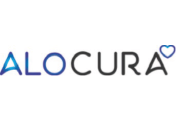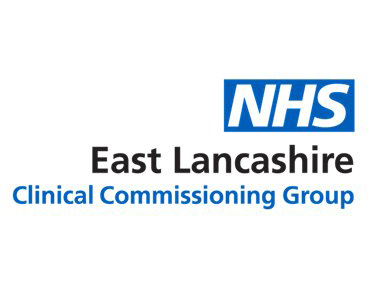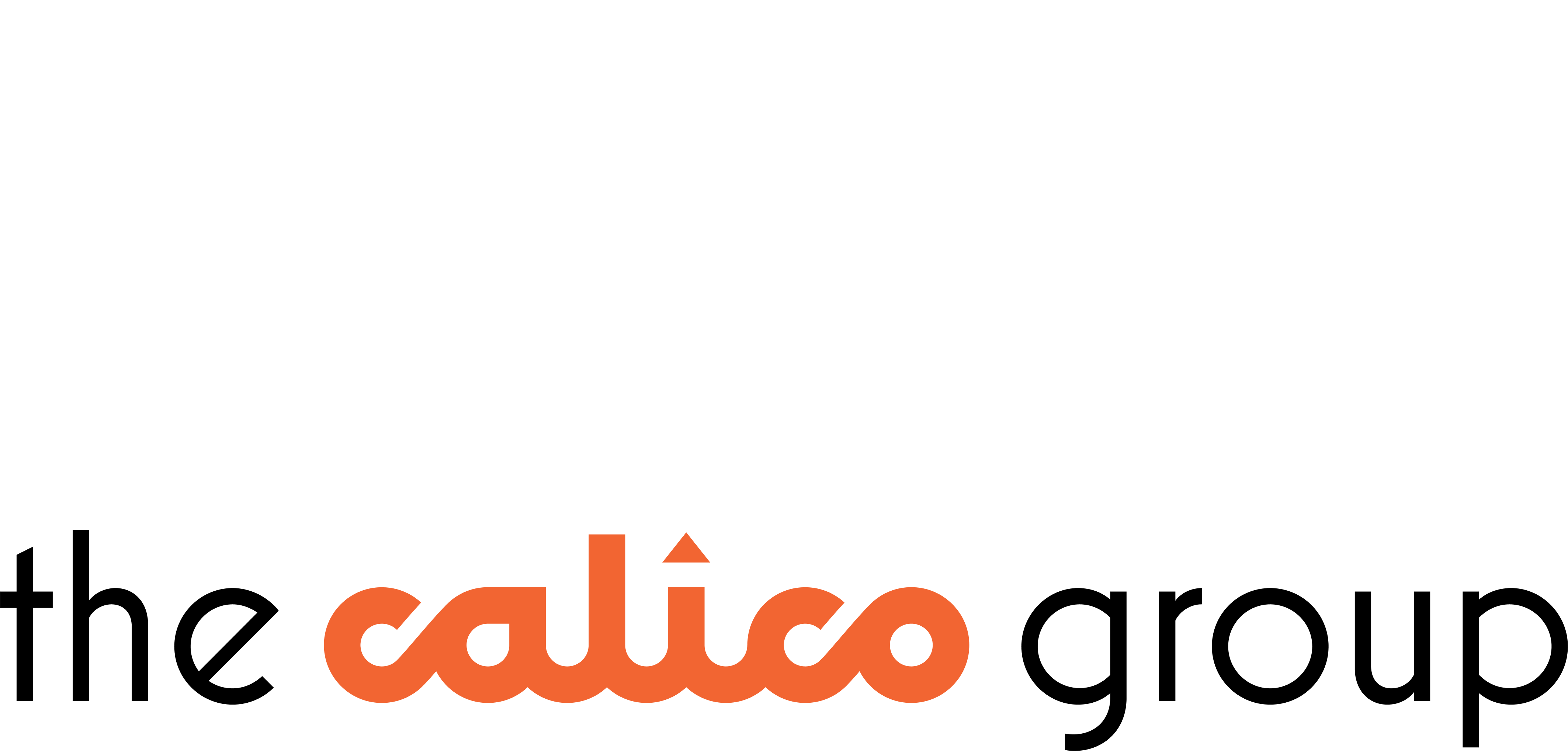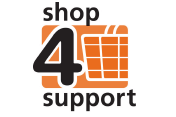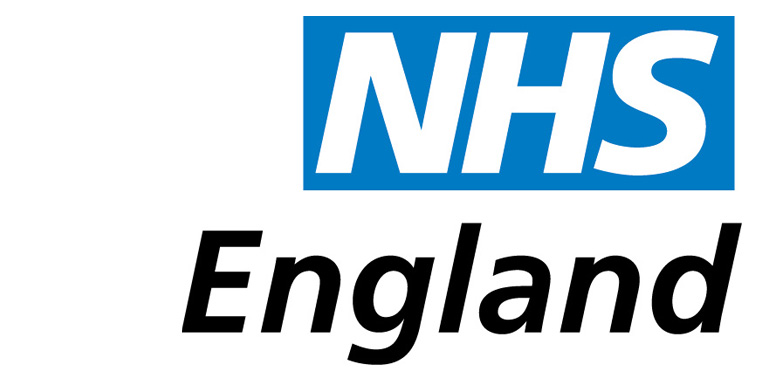My Life’s Day Opportunities new name is ‘Life Opportunities’
Posted on Tuesday, July 20th, 2021
Here at My Life we’re changing the name of our Day Opportunities to ‘Life Opportunities.’
If you attend our service, don’t worry, you’ll still receive the same high level of support, but you’ll also know better than anyone that our service is about a whole lot more than daytime activities (as much as we enjoy them!) So the name ‘Day Opportunities’ only reflects just a little of what we do.
 The service we give is all about looking at the whole lives of the people we support, listening to them and their families and understanding what they can do, rather than what they can’t. This ties in with Wigan Council’s Deal for Adult Social Care and Wellbeing, which views “everyone as unique individuals who have strengths, assets, gifts and talents” to be used.
The service we give is all about looking at the whole lives of the people we support, listening to them and their families and understanding what they can do, rather than what they can’t. This ties in with Wigan Council’s Deal for Adult Social Care and Wellbeing, which views “everyone as unique individuals who have strengths, assets, gifts and talents” to be used.
We support people with aspects of their lives like housing and help with family leadership. We involve them in work and volunteering opportunities, social enterprise and much more.
As Jodie Crompton, Manager of My Life’s Day Opportunities at Leigh says: “We give people the tools they need to feel comfortable and lead their best lives in their own communities. That means helping people to be confident and happy to live independent lives, with the support they need, beyond My Life.”
So in short, the service will continue and develop as it always has, just with a name that reflects more closely what we do. You’ll see our name change gradually, over the next few months.
This summer, we’ve got lots of exciting things planned, including our ‘Under the Sea’ themed programme, which includes seaside trips, beachcombing art, aquariums, sensory water experience, boating and more. See our flyer here for more details!
We welcome new members – if you know someone who would like to join in, get them to call 01257 472 900 or email info@my-life.org.uk
My Life Blog – Caroline Tomlinson: “Why empowering families through shared experience achieves so much when navigating the care system.”
Posted on Monday, July 5th, 2021
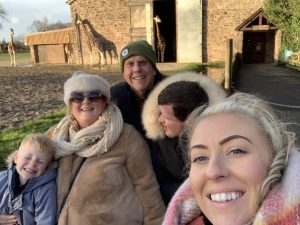 Recently, the latest of our three-week Family Leadership courses came to a close. They are a thought-provoking experience not just for the families who participate in them but for My Life as an organisation too.
Recently, the latest of our three-week Family Leadership courses came to a close. They are a thought-provoking experience not just for the families who participate in them but for My Life as an organisation too.
So in this month’s blog I thought it might be useful to explain not just what these courses do, but the huge impact of taking time out of the day-to-day grind of the care system to find a more mindful and positive way to plan a meaningful future for people.
There was one comment after the course which summed it all up for me: “Every so often I need an injection of positivity and energy to get me back on track to working towards my dreams and goals for my son and our family. I absolutely got this.”
So the basic premise behind the Family Leadership course – which is free – is for interested families to consider what a good life might look like for themselves and their loved ones who need support. Too often, sadly, people come to us in moments of crisis, unsure of the next steps in the care of their loved one. Sometimes, they tell us that they feel they are not being listened to – or receiving the care and support they need.
While the course isn’t about finding an immediate solution to such pressing issues, what it does do is take a step back from that moment of crisis and ask people to think more deeply about what they really want. We look at how people can influence change, develop new solutions and build action plans. The course emphasises the importance of community networks and teases out the additional support that might be available – we can use our vast experience in care and support to help families navigate through the system.
Somebody told me that they learnt much more than they ever could trying to Google what the care system structure is and how to navigate it successfully. Which is great, but I was just as encouraged by what she said next. “I learnt to have more confidence in my own ability and aspirations,” she added – and some of that comes from the atmosphere in the room.
We want the Family Leadership courses to be a collaborative experience, rather than simply me talking about my journey from the front of the room. I always say to people that they might learn 10 per cent from me, but 90 per cent will come from the other people who are in the same situation. What most find is that they have knowledge acquired from a professional who is a specialist in a specific area, but the only people who have a broad understanding of the care ecosystem are other families. So I encourage people to find stories from others, take the parts that are relevant and start to carve a plan that works best for them.
This development of a plan for where people want to be in five years’ time comes after we’ve discussed their hopes for the future and looked at the practical inputs necessary to make these wishes happen. But it’s who people need to enrol and involve to activate and maintain that plan which is critical. We call it a circle of support, which has become fundamental to the whole idea of My Life as a community where everyone belongs. We often come across people who say they have nobody they can turn to – or they feel embarrassed to ask for help – so if we can facilitate just one person to come into their circle, then we will have succeeded.
It’s interesting how much emotion people bring to these courses. I understand why, of course. People become resentful – quite naturally – about what they can’t do, rather than consider what is possible. Which is why I see family leadership as a form of life coaching – ultimately we’re asking people to understand their situation and their future, and in so doing be mindful in their decision making. The course spends some time steering people away from this idea of ‘fighting the system,’ even if it has yet to work for them; by understanding how local authorities work and planning a future within that infrastructure you can develop positive, considerate and professional relationships with those who provide support. All of which means you are far more likely to be able to live that smoother, more manageable life you envisage for yourself and your family.
As someone else said, the idea of planning rather than being planned for, even if those plans have to change, is really valuable. Presenting solutions rather than expecting social services to come up with a plan is possible. And actually, much of this approach is based on a model called Planning Alternative Tomorrows with Hope, a person-centred planning tool which definitely worked with my family; it’s the empowerment of people in all aspects of their life with an innate understanding of mutual regard and respect. That’s why this course is free and we give people lunch; we are living out the theory that hospitality and kindness is much more likely to result in positive outcomes. The fact that someone told me the food and hospitality was good on the course is another win!
We’ve now begun to take some of the elements of the course that have really changed lives and approaches and applied them in bespoke life-coaching sessions for families who can’t access Standish. We’re going to train staff to be ‘circle facilitators’ so that we can offer this coaching based around a network of support to anyone at any time.
Because ultimately, family leadership – and My Life – is about looking after people. It’s about getting people together, giving them information and food for thought, and encouraging them to make positive connections.
Caroline Tomlinson, My Life Founder and Chief Executive Officer
To enquire about our next Family Leadership course or family life-coaching sessions and how we can help you, call 01257 472 900, or email info@my-life.org.uk.
Subscribe to My Life’s Blog
Like what you’ve read? Subscribe here and receive our blog direct to your inbox!
Tell us what you think
Please leave a comment below.
My Life Blog – Caroline Tomlinson: ‘How we’re using Equine Guided Learning to help people get back in the saddle after lockdown’
Posted on Wednesday, May 12th, 2021
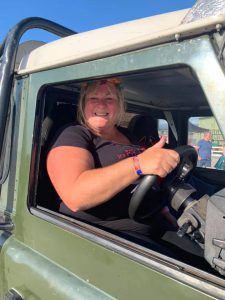 I think everyone would agree that the last year or so has been relentless. Whether it’s been furlough or front-line work, parenting or working from home (often at the same time!), we’ve had to take on almost a war-time mentality, putting everything into every day. And often having to do so while feeling isolated and lonely. It’s been tough, hasn’t it, and what became really obvious to me is that a lot of the heavy lifting of this pandemic has been left to women – not exclusively of course, but overwhelmingly the stories I hear are from a female perspective.
I think everyone would agree that the last year or so has been relentless. Whether it’s been furlough or front-line work, parenting or working from home (often at the same time!), we’ve had to take on almost a war-time mentality, putting everything into every day. And often having to do so while feeling isolated and lonely. It’s been tough, hasn’t it, and what became really obvious to me is that a lot of the heavy lifting of this pandemic has been left to women – not exclusively of course, but overwhelmingly the stories I hear are from a female perspective.
I’m not sure that people will fully realise that their mental health has been severely affected until they begin to emerge into some sort of normality, and I certainly felt over the last few months that it will be really important for us to discover ourselves, get in touch with ourselves and most importantly do something for ourselves again. Which was when I realised that the horses and ponies at My Life’s inspiring equestrian centre in Standish could help.
In America, they’ve done a lot of work around equine facilitated learning and equine assisted therapy, and we’ve brought some of those lessons into the work with My Life members. It makes a lot of sense; you use a horse as a sensory experience, a means by which to understand your own emotions and behaviour, and sometimes as a conduit by which to communicate and build rapport.
Horses are also herd animals, like us, so it felt to me that as lockdown eased there was a way in which we could bring a small group of women together with the intention of reconnecting them with life, and building self-esteem and confidence through shared experiences with our horses. To be quite honest, I think we’ve also all learned that life’s too short to miss out on doing something you’ve always loved but not had time for – or really wanted to do. My experience, of course, is working with lots of families who’ve had struggles around loved ones with a disability. Really, the end goal is the same for us all – to have what we consider a good life, doing stuff that we enjoy.
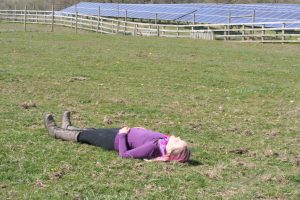 So we called the course Getting Back In The Saddle: Empowerment through Equine Guided Learning and three weeks in, it’s been an emotional, instructive and often hilarious ride. Not that we have done loads of riding actually; this is more about engaging with animals and people. In the first session, before we even went near a horse, we stood in an open field and listened to the noises of the countryside. We then lay down in that field. It probably looked really strange. But in that moment of quiet mindfulness, I think we all realised we haven’t had a single moment to be with ourselves in the last year.
So we called the course Getting Back In The Saddle: Empowerment through Equine Guided Learning and three weeks in, it’s been an emotional, instructive and often hilarious ride. Not that we have done loads of riding actually; this is more about engaging with animals and people. In the first session, before we even went near a horse, we stood in an open field and listened to the noises of the countryside. We then lay down in that field. It probably looked really strange. But in that moment of quiet mindfulness, I think we all realised we haven’t had a single moment to be with ourselves in the last year.
When we did introduce the horses, it was like I’d sat Cloud and Magic in a room beforehand and briefed them about how I needed them to behave. As each person led a horse in the arena, Cloud and Magic reflected their mood. So people who were anxious, or in a low mood saw that come out in the horse, even if they hadn’t fully processed their emotions themselves. It was like looking in a mirror.
Over lunch from our Stable Door Cafe – another thing everyone enjoyed was having someone’s else’s food for the first time in ages! – we talked. And it all came out. A woman who worked so hard for the NHS through the pandemic got pretty emotional when she realised that she’d waited 30 years to do something like this for herself. A woman who’d run a care home in a pandemic – you could see on her face the pressure she’d been under – revealed she needed to be able to get in touch with herself and others outside of that environment. Nearly everyone agreed they didn’t realise the heaviness of the weight they’d carried until they started to hear these stories from other people – it gave them the confidence to work through their emotions, where they might otherwise have crashed and burned out.
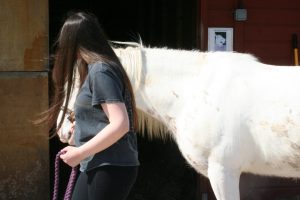 Which makes the five-week course sound quite heavy, but the next week, we started out by riding hobby horses rather than actual horses. They did the walk, the trot, they all went back to being kids again – and there was so much laughter. Being playful, being able to laugh at yourself and with others is so important for mental health.
Which makes the five-week course sound quite heavy, but the next week, we started out by riding hobby horses rather than actual horses. They did the walk, the trot, they all went back to being kids again – and there was so much laughter. Being playful, being able to laugh at yourself and with others is so important for mental health.
Later, we started introducing them to two new ponies, too, which was all about building mutual trust, understanding the power of your responses. And we talked about how those responses and behaviours are so crucial in your interactions with others.
Which ultimately emphasised to me again the importance of our environment at Standish to the people we support. One woman we were helping to transition from a secure environment to her own home built the rapport with her team by using the horses here as a ‘common third’ to develop trust. In fact, we actually did some additional equine assisted learning with her team members so they could appreciate how their thoughts, feelings and behaviours impacted on how the horse felt; once they understood how an animal reacts, it became obvious to them how they needed to act around someone who they were caring for. We’re beginning to use the horses as part of staff development and training in this way.
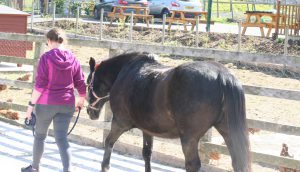 I’m reminded of Kieran, too, who was also transitioning from a secure environment to living in his own home with support. He’d had a love of horses before he ended up in residential care, and the natural conversation we had as he trotted around Standish on horseback gave me the confidence that we would be able to help a young man that everyone else had written off.
I’m reminded of Kieran, too, who was also transitioning from a secure environment to living in his own home with support. He’d had a love of horses before he ended up in residential care, and the natural conversation we had as he trotted around Standish on horseback gave me the confidence that we would be able to help a young man that everyone else had written off.
All I’d seen in reports was what he couldn’t do, rather than what he enjoyed. Within a couple of hours with the horse, I saw an empathetic, gentle and kind character – which might otherwise have taken months to tease out. I was able to work out the make up of his team, who would be best at supporting him. He’s now thriving. All because of a horse ride.
So yes, sometimes positive change can come with a change of environment, a new experience. But it also comes when people are empowered to put themselves at the centre of their emotional, physical and mental health needs. At My Life, our motto is creating a community where everybody belongs. Grooming these horses together, letting the power of our emotions flow as a group and ultimately helping people on the road back to living their best lives, feels great.
Caroline Tomlinson, My Life Founder and Chief Executive Officer
To find out more about our Equine Guided Learning sessions for groups and individuals please contact us on 01257 472 900, or email info@my-life.org.uk for more details.
Subscribe to My Life’s Blog
Like what you’ve read? Subscribe here and receive our blog direct to your inbox!
Tell us what you think
Please leave a comment below.
Love your job! Work for My Life!
Posted on Wednesday, April 21st, 2021
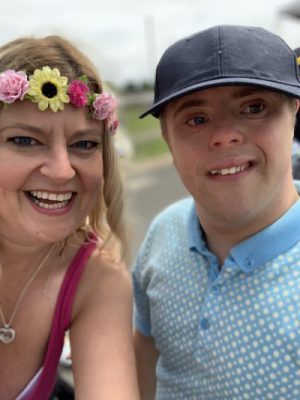
Live in Standish or nearby? Work locally and make a big difference to others!
Here at My Life we connect people with their communities, helping people who need support to live a good life.
We’re currently recruiting for Tutors, Support Staff, Learning Support Assistants, Sessional Facilitators and Administrators. You’ll get to be part of a great team and receive excellent rates of pay and personal development opportunities!
Find out more – come to one of our Recruitment Evenings!
Dates: 27th April, 19th May or 17th June, 7pm – 8.30pm
Venue: My Life, Thompson House Equestrian Centre, off Pepper Lane, Standish, WN6 0PP
Book on 01942 233 422 or email hr@my-life.org.uk
My Life Blog: Caroline Tomlinson: ‘Why investment in clinical support is essential in social care’
Posted on Wednesday, April 7th, 2021
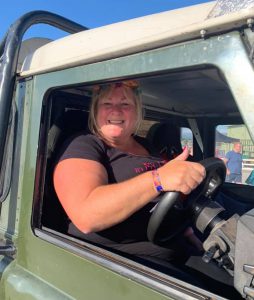 One of the key values of My Life is that we always offer person-centred, bespoke care for people who need support in their homes and day-to-day lives. Generic, off-the-peg assistance from a pool of ever-changing staff on minimum wage just doesn’t provide long term benefits for people and their families. We believe the outcomes we want to deliver for people and their families can only come from teams of motivated, skilled people who are invested in the care they provide.
One of the key values of My Life is that we always offer person-centred, bespoke care for people who need support in their homes and day-to-day lives. Generic, off-the-peg assistance from a pool of ever-changing staff on minimum wage just doesn’t provide long term benefits for people and their families. We believe the outcomes we want to deliver for people and their families can only come from teams of motivated, skilled people who are invested in the care they provide.
And as we began to help people with complex needs, we realised there was a real need – and added value – in offering clinical support, not just for the people who need it most, but their teams of staff, too. Employing a Clinical Lead – which I have to say is not usual in our sector – has been one of our most important hires of recent times.
We often find, especially when dealing with funders or commissioners, that there is a push-back when it comes to budgeting for or employing additional nursing staff. But actually, it’s not just nursing skills that are required in a complex case, it’s a professionalism and ability to work with a family; even if technically a person doesn’t have continuing healthcare needs, the medication might be so complicated that it needs someone with the level and competence of a Clinical Lead to guide everyone through to a satisfying solution. They don’t have to be in the home all the time. But they need to be on hand when required to ensure high-quality care is being given.
And the rest of the time, of course, the staff need to be confident in the job they’re doing. This is a big part of our Clinical Lead’s role. Kelly coaches our staff to treat those we care for as people with lives rather than patients that need nursing. That requires quite a lot of nuance, adaptability and confidence, so Kelly will sit with our staff as they do their jobs and provide ongoing support and feedback to enhance the more formal training they will have already received.
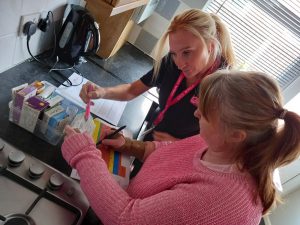
Clinical Lead Kelly Robinson at work training My Life staff
This isn’t about scrutinising staff, although naturally we have very high standards and aspirations for all our teams. Kelly will be working on shift with them, being a positive role model and empowering people to build confidence, competence and a capability to do the role – and make decisions for themselves.
Which makes sense; many people who work in the care sector are visual, practical learners. You wouldn’t ask a plumber or electrician to do their apprenticeship in a formal classroom setting, and in my view it should be the same with personalised care – for it to work effectively you need to have staff with a skilled approach who can apply not just knowledge but good judgement to what might be a complex situation. Having care staff just logging hours providing basic support doesn’t help anyone.
What Kelly helps drive with her clinical background, professionalism and decision making are the values of My Life. When she steps back from a team, she is confident that they have the skills to provide the best package of care, not just the agreed hours. She is, however, always available to respond to the many challenges that complex care packages bring up – a busy role but one we’re so pleased to be able to provide.
All of which underlines that My Life doesn’t just offer people emotional or physical support; we have an understanding and appreciation of their whole situation and deal with it in a way that has a basis in both high-quality care and clinical excellence. The whole package, in fact.
Caroline Tomlinson, My Life Founder and Chief Executive Officer
Subscribe to My Life’s Blog
Like what you’ve read? Subscribe here and receive our blog direct to your inbox!
Tell us what you think
Please leave a comment below.
Course: Getting Back In The Saddle – Helping Women Feel Empowered After Lockdown, Through Equine Guided Learning
Posted on Thursday, March 25th, 2021
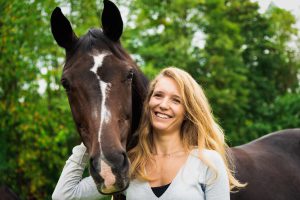
Five-week course, Saturdays from 24th April, 10.30am until 3.30pm
The last year has been very difficult, but for those who have had to juggle family life, children, a career, home schooling, caring responsibilities, relationships, feeling isolated, lonely or simply ‘just having to do everything,’ life has been really tough. The mental health of women has suffered terribly during the pandemic and we want to help you to ‘get back in the saddle.’
As little girls many of us loved the thought of being with horses. Some of us achieved the dream, others just imagined galloping free. As adults we simply haven’t had time, we can’t afford it, we are too fat, not fit enough or are frightened by something that happened in the distant past. We give ourselves so many excuses of why we shouldn’t, but now is the opportunity to re-live your dream and do something for you.
We have crafted a five-week course combining person centred coaching and the use of our horses and other animals as partners in the delivery.
The benefits to you
We will help you to realise your own dreams and goals, discover how to make them become a reality, build your confidence, self-esteem, feel in control and experience real joy, being with horses and our other animals. This is a chance to slow down as we offer guided instruction, response and reflective practice, enabling you to communicate in a way in which the horse understands, through body language and movement.
You will have the chance to learn from our horses by developing a true relationship that is hugely rewarding and empowering. You’ll understand how they respond to each other and to humans, through guided observation. You will spend time touching, stroking and grooming them, learning how they move and generally building your confidence with them. For some, climbing aboard will be your ultimate aim, for others just being with the horses will be enough. You will be encouraged to develop at your own pace and reach your personal goals.
“Horses are magical beautiful beings that don’t judge, they seek love, an open heart, a humble soul and are a joy to be with. To express ourselves in the same way as horses understand, is to let the power of our emotions flow, to be present, engaged and feel connected.”
Who is the course for?
The course is for any woman of any age, from those who only imagined being with horses to those more experienced, albeit a bit rusty. This is as much about empowering you, as it is being with the horses. It is now time to do something for you, to rebuild your confidence, energy levels, self-esteem and to spend some time doing something that you will enjoy.
About the course coach
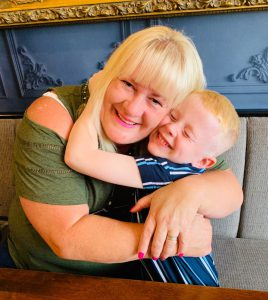
Caroline Tomlinson is the founder and CEO of the charity My Life Legacy. She is a qualified riding instructor, life coach, trainer and mentor. Her ‘horsey career’ came to a halt when her son contracted meningitis at six months old and was left with complex disabilities. Caroline had to discover a new dream and a new pathway to live a good life, albeit different to what she had planned. She works with people to empower, coach and encourage every individual to live a good life and is now combining all of her learning with the wonderful facilities at Thompson House Equestrian Centre, to help those struggling right now.
The course costs £55 per session or £250 for the full course of five weeks
Participants should attend all sessions to maximise the full benefit and feel-good factor.
This includes refreshments and lunch from The Stable Door Café & Ice Cream Parlour.
Income generated from this course will support the wonderful work of our charity, enabling our members to benefit from the joys of our horses and other animals.
Venue
My Life, Thompson House Equestrian Centre, Pepper Lane, Standish, Wigan, WN6 0PP.
To Book
Call 01257 472900 or email info@my-life.org.uk.
This course is not restricted to women and can be tailored to the needs of other individuals and groups, including work-place team building, much needed after separation caused by the pandemic.


